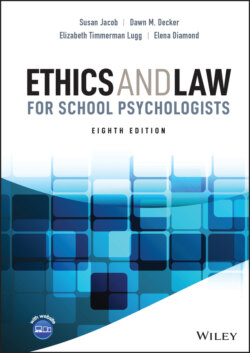Читать книгу Ethics and Law for School Psychologists - Susan Jacob - Страница 99
Lawsuits under Federal Law (Section 504, ADA, IDEA, and Section 1983)
ОглавлениеFederal antidiscrimination laws, such as Section 504, ADA, and Title IX of the Education Amendments of 1972, allow parents to sue a school district for violation of their child’s rights under those laws. In successful suits, parents have been able to secure a court order commanding the school to take steps to comply with the law, and at times they have been awarded monetary damages (see Chapters 5 and 9).
IDEA also allows parents of special education students to file a lawsuit when they believe their child’s rights under the law have been violated. Except for unusual circumstances, parents are required to exhaust administrative remedies (e.g., due process hearings) available to them before they pursue a court action under IDEA. If parents prevail in a court action under IDEA, they may recover their attorney fees and/or be reimbursed for private school tuition or compensatory education for their child (see Chapter 4). Parents typically have not been able to recover monetary damages under IDEA.
In addition to claims filed under Section 504, ADA, and IDEA, an increasing number of lawsuits are filed against schools and school personnel under Section 1983 of the Civil Rights Act of 1871. In accordance with Section 1983, any person whose constitutional rights (or rights under federal law) have been violated by a government official may sue for damages in federal court, and the official may be held liable for the actual damages. Section 1983 lawsuits often are referred to as “constitutional torts,” and, similar to common torts, the court decides whether there was a duty to a student, whether the duty was breached (i.e., the student was deprived of their rights under constitutional or federal statutory law by a public official), whether the student suffered injury, and whether the breach of duty was the proximate cause of the student’s injury. A student whose civil rights were violated under Section 1983 may sue the school board, principal, teacher, and/or the school psychologist responsible in federal court, thereby bypassing any state law granting school personnel immunity from liability during performance of their job duties.
A number of student lawsuits concerning school disciplinary actions (e.g., illegal search and seizure, unreasonable corporal punishment) have been filed under Section 1983. School officials may have qualified immunity from Section 1983 lawsuits. The standard for qualified immunity applicable to government (school) officials is as follows: “Government officials performing discretionary functions are shielded from liability for civil damages unless their conduct violated clearly established statutory or constitutional rights of which a reasonable person would have known” (Harlow v. Fitzgerald, 1982, p. 817). Hummel et al. (1985, p. 78) suggested that school personnel generally will not be held liable in Section 1983 lawsuits as long as they are “acting clearly within the scope of their authority for the betterment of those they serve” (e.g., Landstrom v. Illinois Department of Children and Family Services, 1990).
